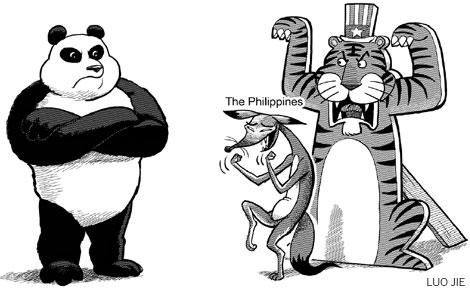

On May 6, the Philippines again created trouble in the South China Sea by illegally detaining 11 Chinese fishermen and seizing a boat in the waters off China's Half Moon Shoal in the Nansha Islands. On the same day, the Philippine military announced a so-called South China Sea defense plan, saying that to protect the Philippines' "national interest", it will resist "China's increasingly assertive behavior in the South China Sea".
The Philippines has recently been creating trouble in the South China Sea. It has sent a supply ship to the Ren'ai Reef off China's Nansha Islands, held joint military exercises with the United States, illegally detained Chinese fishermen and boats, and announced a South China Sea "defense plan", highlighting its increasingly aggressive stance on the the South China Sea issue.
China has long been advocating the use of peaceful means to resolve international disputes and remains committed to resolving the South China Sea issue on the basis of universally accepted maritime laws, for which it has even put forward the idea of "shelving disputes and carrying out common development".
Some countries involved in the South China Sea disputes, including the Philippines, have taken China's tolerance as cowardice and are acting aggressively. The Philippines' provocative actions challenge China's ability to safeguard its national sovereignty. Since the Philippines does not measure up to China either in economic or military strength, why does it dare to repeatedly create trouble in the South China Sea?
The answer lies in the US-Philippine alliance. Before US President Barack Obama paid a state visit to the Philippines, the two countries signed the Enhanced Defense Cooperation Agreement, reinforcing the US-Philippine military alliance. The agreement gives American forces temporary access to selected military bases and allows them to preposition fighter jets and ships. Also, it allows US forces to train Philippine troops to strengthen their maritime defense, and improve their humanitarian assistance and disaster relief activities. Reassured by Washington's security commitment, an emboldened Manila is now trying to act tough over the South China Sea dispute.
The Philippines is not alone in thinking that it will become invincible because of its alliance with the US; some other Asian countries, too, think so. And the US is taking advantage of these countries to implement its strategic rebalancing to Asia to weave a new Asia-Pacific security pattern.
The US' strategic rebalancing has given the Philippines an opportunity to fish in troubled waters. The US believes that China's rapid rise has broken the balance of power in the Asia-Pacific, so it has to implement its "pivot to Asia" strategy.
Copyright ©1999-2018
Chinanews.com. All rights reserved.
Reproduction in whole or in part without permission is prohibited.